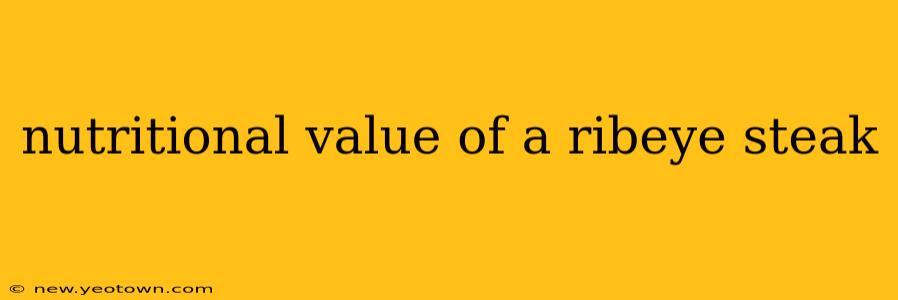The Juicy Truth: Unpacking the Nutritional Value of a Ribeye Steak
The sizzle of a ribeye on the grill, the rich aroma filling the air… few culinary experiences are as satisfying. But beyond its undeniable deliciousness, what's the nutritional story behind this prized cut of beef? Let's dive into the details, exploring not just the nutrients, but also addressing common questions and concerns surrounding this flavorful steak.
It's important to remember that the nutritional profile of a ribeye can vary slightly depending on factors like the animal's diet, its age, and the cut's marbling (the intramuscular fat). However, a general picture provides a solid understanding.
A Nutritional Powerhouse (with caveats):
A 3-ounce serving of a raw ribeye steak generally boasts a considerable amount of:
-
Protein: Ribeye is a fantastic source of high-quality protein, essential for building and repairing tissues, making it a favorite among athletes and those focused on muscle growth. This protein is packed with all nine essential amino acids, meaning your body can't produce them on its own, making them crucial from dietary sources.
-
Iron: This iron is primarily heme iron, a form readily absorbed by the body. This is especially beneficial for those prone to iron deficiency anemia.
-
B Vitamins: Ribeye provides several B vitamins, crucial for energy production, nerve function, and red blood cell formation. Think B12, a vitamin often lacking in vegetarian diets, is present in good amounts.
-
Zinc: This mineral plays a vital role in immune function and wound healing.
-
Selenium: A powerful antioxidant that protects cells from damage.
However, it's equally important to acknowledge the downsides:
-
Fat: Ribeye is known for its generous marbling, contributing to its rich flavor but also its high fat content. This fat is primarily saturated fat, which should be consumed in moderation as part of a balanced diet. Excessive saturated fat intake is linked to an increased risk of heart disease.
-
Cholesterol: Ribeye contains a significant amount of cholesterol. While dietary cholesterol's impact on blood cholesterol is less understood than previously thought, it's still advisable to be mindful of intake, especially for individuals with high cholesterol.
-
Sodium: Depending on preparation methods (e.g., adding salt during cooking), sodium content can be substantial. High sodium intake can contribute to high blood pressure.
Frequently Asked Questions:
Is ribeye steak good for weight loss?
The high fat and calorie content of ribeye make it less ideal for weight loss diets. However, consuming it in moderation as part of a balanced diet, focusing on portion control, isn't necessarily detrimental. Opting for leaner cuts of beef could be a more weight-loss-friendly choice.
What are the health benefits of eating ribeye steak?
The health benefits primarily stem from its rich protein content, essential for muscle building and repair; its iron content, crucial for preventing anemia; and the various B vitamins and minerals contributing to overall health and well-being. However, these benefits must be weighed against the potential downsides of high fat and cholesterol.
How often should I eat ribeye steak?
There's no single answer, as it depends on individual health needs and dietary preferences. As with all high-fat foods, moderation is key. Consider it an occasional treat rather than a staple in your weekly diet.
Is ribeye steak healthier than other cuts of beef?
Compared to leaner cuts like sirloin or tenderloin, ribeye is higher in fat and cholesterol. The "healthiest" choice depends on individual health needs and preferences.
Can I eat ribeye steak if I have high cholesterol?
Individuals with high cholesterol should consult their doctor or a registered dietitian before incorporating ribeye steak into their diet. They may recommend limiting or avoiding high-cholesterol foods.
Ultimately, enjoying a ribeye steak occasionally as part of a balanced and varied diet isn't inherently unhealthy. However, mindful consumption, portion control, and consideration of your individual health needs are crucial for maximizing benefits and minimizing potential risks. Remember to always consult with a healthcare professional or registered dietitian for personalized dietary advice.

